Role of Algebra 2 in College Readiness
Understanding the Importance of Algebra 2
At first glance, Algebra 2 might just seem like another stepping stone in the long journey of mathematical education. Another series of formulas, equations, and graphs to learn. However, it's much more than that. Algebra 2 serves as a critical platform for students, paving the way for more advanced mathematical courses, college readiness, and even career preparation. When you begin your journey with Algebra 2, you're not just learning how to solve equations or graph functions; you're training your mind to think logically, methodically, and critically. You're developing a mathematical mindset that isn't just beneficial for further studies but also proves to be invaluable in daily life and numerous professional fields.
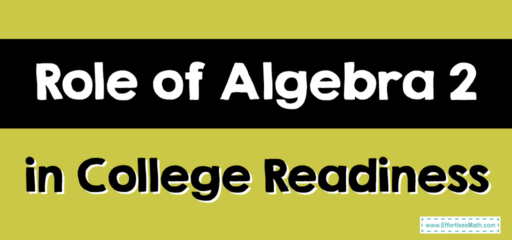
The Foundations: Algebra 1 vs Algebra 2
A Quick Recap: Algebra 1 Basics
As a student, your initial encounter with Algebra might have involved simple equations and inequalities, where the objective was to solve for ‘x’ or ‘y’. Remember sketching those straight lines on graph paper or wrestling with the distributive property? These foundational concepts taught in Algebra 1 are not just isolated topics but stepping stones that lead you to the doorstep of Algebra 2.
Advancing to Algebra 2: Building on the Basics
Algebra 2 takes you on a more in-depth journey of mathematics. Building upon the concepts of Algebra 1, it introduces students to the world of functions, complex numbers, logarithms, and matrices. These topics might sound intimidating, but they’re like a treasure trove of mathematical knowledge that expands your understanding and primes you for future mathematical studies, be it in calculus, statistics, or linear algebra.
The Absolute Best Book to Ace Pre-Algebra
Key Concepts in Algebra 2
Exploring Functions and Their Graphs
In Algebra 2, you dive deeper into the world of functions. You’re introduced to quadratic and exponential functions, which add new shapes to the lines you were used to sketching in Algebra 1. Instead of straight lines, you’ll find yourself graphing curves such as parabolas, ellipses, and hyperbolas.
This exploration of different function types helps you to understand the relationships between variables more comprehensively, and to visualize these relationships graphically.
Delving into Systems of Equations
Have you ever had to deal with more than one equation at a time? Welcome to Systems of Equations. This key concept in Algebra 2 introduces you to situations where multiple equations interact. By solving these systems, you can understand the relationships and dependencies between different variables.
Uncovering Matrices and Determinants
Though matrices might initially seem like an abstract and complex concept, they are an integral part of Algebra 2 and a doorway to the world of linear algebra in college. Matrices help to simplify complicated problems, especially in higher-level math, physics, computer science, and engineering.
Learning how to handle matrices and calculate determinants equips you with tools that not only simplify complex problems but also give you a new perspective on how to manage and analyze data.
Algebra 2 and College Readiness
Strengthening Critical Thinking Skills
Algebra 2 plays an instrumental role in enhancing students’ problem-solving and critical-thinking skills. It’s not merely about arriving at the right answer but understanding the path you took to get there. Students grapple with abstract concepts, analyze relationships, and devise strategic approaches to find solutions. This promotes a level of thinking that extends beyond rote memorization, helping to nurture critical thinkers.
As you enter college, these skills become even more crucial. You’ll face complex problems that require more than just finding a solution. They demand understanding, evaluation, and strategic problem-solving – skills honed by studying Algebra 2.
Broadening Knowledge for Higher-Level Math Courses
Algebra 2 serves as a springboard for more advanced math courses. It forms the foundation for subjects such as calculus, statistics, and even some areas of physics. Without the core concepts taught in Algebra 2, understanding these higher-level courses can be daunting.
When you study calculus, you’ll see the principles of functions and limits, derivatives, and integrals, all of which are rooted in the knowledge you gain from Algebra 2. Similarly, understanding probability distributions in statistics becomes easier with the base of functions and equations you learn here.
Preparing for STEM Careers
If you’re a student aiming for a career in Science, Technology, Engineering, or Mathematics (STEM), mastering Algebra 2 becomes particularly crucial. It forms the backbone of many mathematical and scientific concepts used in these fields.
From understanding the physics of motion to programming algorithms in computer science, analyzing data sets in biotechnology, or solving complex engineering problems – the principles learned in Algebra 2 surface time and again. By mastering Algebra 2, you’re not just preparing for the next math class, but potentially setting a strong foundation for your future career.
Best Algebra Prep Resource
Real-World Applications of Algebra 2
Beyond the realm of academia, Algebra 2 has real-world applications that make it a practical subject for all students. Whether you’re planning a career in economics, engineering, physics, or computer science, or even if you’re stepping into a field unrelated to math, Algebra 2 has something to offer.
In economics and business, understanding functions and relationships between variables can help in predicting market trends or managing finances. In physics, the principles of Algebra 2 allow you to calculate speed, understand motion, or analyze forces. In computer science, it’s used in creating algorithms, data processing, and even in the development of computer graphics.
The Impact of Algebra 2 on Standardized Tests
SAT and ACT: How Algebra 2 Helps
The concepts learned in Algebra 2 feature heavily in standardized tests such as the SAT and ACT. Understanding functions, and systems of equations, and dealing with complex numbers can be pivotal to your performance in these tests. Having a firm grasp of these topics can boost your math scores significantly, opening up broader college admissions opportunities.
Algebra 2 in AP Courses
When it comes to Advanced Placement (AP) courses, the role of Algebra 2 can’t be overstated. Courses such as AP Calculus, AP Physics, and AP Statistics all rely on the principles taught in Algebra 2. Understanding these topics well can not only help you perform better in these challenging courses but also provide a robust foundation for your college studies.
Overcoming Challenges in Algebra 2
Strategies for Success
Like any subject, Algebra 2 can seem daunting initially. The jump from linear to quadratic equations, the introduction of logarithms, and learning to navigate systems of equations may feel overwhelming. However, with the right strategies and mindset, you can master Algebra 2.
- Consistent Practice: Mathematics is a subject where consistency matters. Regular practice helps you understand concepts and techniques, and more importantly, helps you remember them. Try to solve a variety of problems to test your understanding and improve your problem-solving skills.
- Understand, Don’t Memorize: While memorization might help in the short term, understanding the principles and concepts will serve you well in the long run. When you truly comprehend a concept, you can apply it to different problems, even those you’ve never encountered before.
- Don’t Be Afraid to Ask for Help: If you’re struggling with a concept or problem, don’t hesitate to seek help. This could be from your teacher, a tutor, classmates, or even online resources. Sometimes, a different perspective or explanation can make a complex concept clear.
- Patience: Mastery doesn’t come overnight. It takes time, effort, and patience. Don’t be discouraged by initial difficulties. Be patient with yourself and keep pushing forward.
The Future of Mathematics Education: More than Just Algebra 2
While Algebra 2 is a critical component, the future of mathematics education is much broader. Modern teaching philosophies emphasize a holistic approach, encouraging students to explore the connections between different branches of math, rather than treating them as isolated subjects.
Algebra 2 is a stepping stone in this journey. As you master Algebra 2 concepts, you’re not just preparing for calculus or statistics; you’re laying the groundwork for a comprehensive understanding of mathematics.
Today’s math education aims to create a generation of critical thinkers who can apply mathematical principles to solve real-world problems. This approach doesn’t discount the importance of Algebra 2 but places it within a broader context, emphasizing how it connects to other mathematical disciplines and real-world scenarios.
So, as you tackle Algebra 2, remember you’re not just learning a subject, you’re developing skills that will serve you well in future studies, your career, and life.
Conclusion
Frequently Asked Questions (FAQs)
- Why is Algebra 2 so important for college readiness? Algebra 2 is a foundational math class that builds the skills necessary for higher-level math courses in college. It also helps develop critical thinking skills.
- Is Algebra 2 necessary for students not pursuing STEM? Yes, it’s not just beneficial for STEM students. Algebra 2 concepts are used in various fields and even in daily life situations.
- What are some strategies for succeeding in Algebra 2? Consistent practice, seeking help when needed, understanding the concepts rather than rote memorization, and patience are key strategies for success.
- What is the best Algebra textbook for high school students?
Choosing the best Algebra textbook depends on the individual student’s learning style and needs. However, a textbook that is widely appreciated for its clear explanations, well-designed problems, and comprehensive coverage of topics is “Algebra II for Beginners.”
“Algebra II for Beginners” is a fantastic resource for high school students, especially those who are just starting their journey in Algebra 2. It breaks down complex concepts into manageable segments, making the learning process less intimidating for beginners.
One of the standout features of this textbook is its step-by-step explanations. Each solution is thoroughly explained, ensuring students not only know the ‘how’ but also understand the ‘why’ behind every step. This focus on understanding helps students to develop their problem-solving and critical-thinking skills.
- How does Algebra 2 prepare students for standardized tests? Algebra 2 concepts feature heavily in standardized tests like the SAT and ACT, so understanding these concepts can boost your scores.
- What are some real-world applications of Algebra 2? Algebra 2 is used in economics, computer science, physics, and everyday situations like managing finances or predicting trends.
The Best Books to Ace Algebra
Related to This Article
More math articles
- How to Solve a Quadratic Equation? (+FREE Worksheet!)
- How to Complete the Table of Division Big Numbers By One-digit Numbers
- Algebra Puzzle – Challenge 32
- Real-Life Math Problem With Credit Card Utilization
- 10 Most Common HSPT Math Questions
- 3rd Grade OST Math Worksheets: FREE & Printable
- Embark on Your SHSAT Math Adventure: Introducing the “SHSAT Math for Beginners” Solution Manual
- Algebra Puzzle – Challenge 51
- Improving Your Math in College: What You Should Do
- Intelligent Math Puzzle – Challenge 78
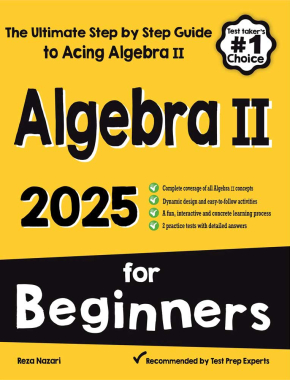

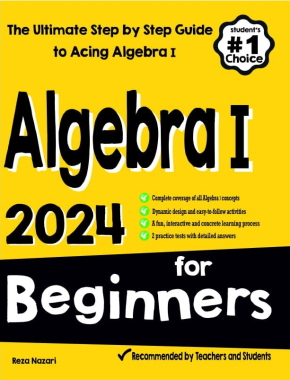
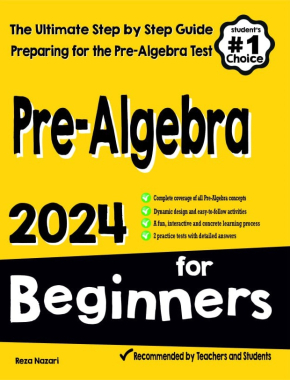
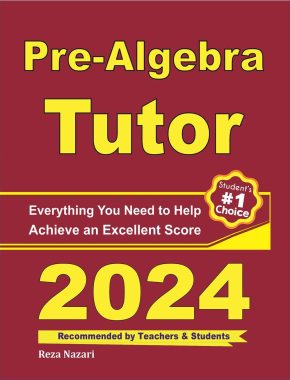
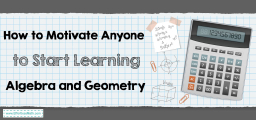



What people say about "Role of Algebra 2 in College Readiness - Effortless Math: We Help Students Learn to LOVE Mathematics"?
No one replied yet.